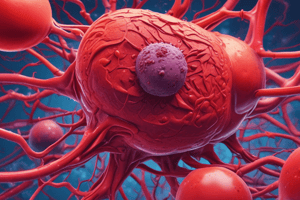Podcast
Questions and Answers
What is the pharmacological class of Alteplase (Activase)?
What is the pharmacological class of Alteplase (Activase)?
- Plasminogen Activator (correct)
- Thrombolytics
- Antiplatelets
- Beta Blockers
What is the therapeutic class of Alteplase (Activase)?
What is the therapeutic class of Alteplase (Activase)?
Thrombolytics
What conditions is Alteplase (Activase) used to treat?
What conditions is Alteplase (Activase) used to treat?
Acute MI, pulmonary embolism, acute ischemic stroke
Which of the following drugs is NOT in the same classification as Alteplase (Activase)?
Which of the following drugs is NOT in the same classification as Alteplase (Activase)?
What are some major contraindications for the use of Alteplase (Activase)?
What are some major contraindications for the use of Alteplase (Activase)?
Alteplase (Activase) should be administered _____ only.
Alteplase (Activase) should be administered _____ only.
Alteplase (Activase) has a long half-life and has specific antidotes available.
Alteplase (Activase) has a long half-life and has specific antidotes available.
What serious side effect is associated with the use of Alteplase (Activase)?
What serious side effect is associated with the use of Alteplase (Activase)?
Match the nursing considerations with their actions:
Match the nursing considerations with their actions:
Flashcards are hidden until you start studying
Study Notes
Alteplase (Activase) Overview
- Pharmacological Class: Plasminogen Activator
- Therapeutic Class: Thrombolytics; classified as Pregnancy Category C
Actions and Uses
- Administered for acute myocardial infarction (MI), pulmonary embolism, and acute ischemic stroke.
- Aids in restoring patency of central IV catheters using Cathflo Activase.
- Fibrin-specific, activating plasminogen to convert it into plasmin, which digests fibrin to break down clots.
Other Drugs in Class
- Includes tenecteplase, Cathflo Activase, and reteplase.
Interactions
- Increased bleeding risk when used with NSAIDs, heparin, warfarin, thrombolytics, and antiplatelets.
- Contraindicated in cases of active bleeding, significant trauma history within 2 months, major surgeries, GI bleeding, atherosclerosis, and pregnancy.
Administration Considerations
- Administered intravenously (I/V) only.
- Best started within 3 hours of the precipitating event, with immediate use for reinfarction.
Toxicity and Antidote
- Possesses a short half-life and lacks specific antidotes.
Side/Adverse Effects
- Serious risk of bleeding, including internal and superficial sites, notably intracranial hemorrhage.
Nursing Considerations
- Obtain baseline labs: platelet counts, hemoglobin (Hgb), hematocrit (Hct), aPTT, PT, INR, and fibrinogen levels.
- Ensure adequate IV access for medications and have emergency equipment available.
- Monitor for bruising, spontaneous bleeding, and vital signs.
- Apply pressure dressings to recent wounds and watch for signs of internal bleeding and changes in consciousness.
- Maintain bed rest during infusion.
- After therapy, administer heparin or aspirin to prevent rethrombosis, along with beta-blockers for myocardial oxygen management and H2 antagonists or proton pump inhibitors to prevent GI bleeding.
Studying That Suits You
Use AI to generate personalized quizzes and flashcards to suit your learning preferences.



